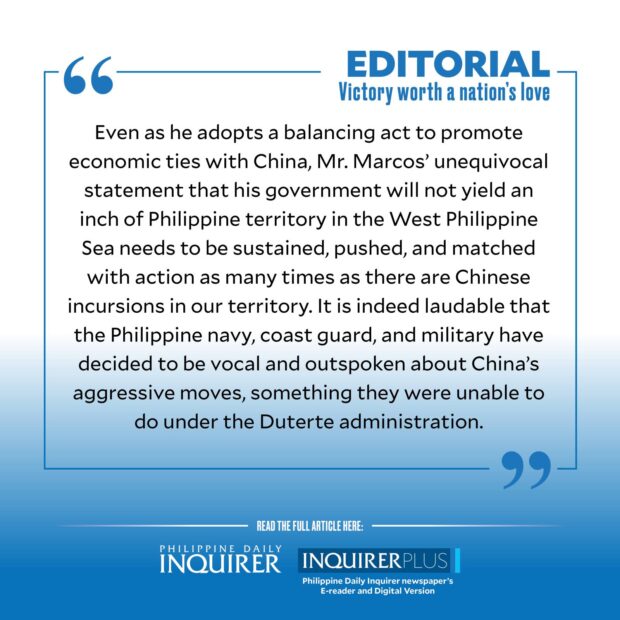Because of the unfortunate Duterte presidency, the Philippines has never really given proper love to the country’s historic victory against China’s sweeping claims in the South China Sea. When the decision of the Permanent Court of Arbitration (PCA) was handed down on July 12, 2016, seven years tomorrow, it fell upon then newly installed President Rodrigo Duterte to claim the unprecedented win.
But a few months into his term, Duterte announced in December 2016 that he would “set aside” the arbitral ruling as the Philippines was “not ready” to fight with China. Worse, in 2021, Duterte thrashed the arbitral ruling altogether. “They filed a case and we won. In real life, between nations, that paper is nothing. Actually, if you give that to me, I will tell you ‘son of a b**** that is only a scrap of paper. I will throw that in a wastebasket,’” Duterte said in a late-night address on May 6, 2021.
It’s worth recalling what that “scrap of paper” actually said. The PCA was established in 1899 to resolve disputes involving territorial, maritime, sovereignty, human rights, and other issues, and counts 122 nations as signatories. In ruling on the Philippines’ arbitration case, The Hague-based tribunal “… concluded that there was no legal basis for China to claim historic rights to resources within the sea areas falling within the ‘nine-dash line.’”
Further, the ruling stated: “Having found that certain areas are within the exclusive economic zone (EEZ) of the Philippines, the Tribunal found that China had violated the Philippines’ sovereign rights in its exclusive economic zone by (a) interfering with Philippine fishing and petroleum exploration, (b) constructing artificial islands, and (c) failing to prevent Chinese fishermen from fishing in the zone.”
Fueled by Duterte’s policy of appeasement to China for economic gains and by disdain for his predecessor, the late President Benigno Aquino III whose administration filed the case before the PCA, the Philippines officially undermined our legal victory and allowed for a regime of persistent and intransigent intrusions by China in the West Philippine Sea. In the six years of Duterte’s administration, hundreds of Chinese militia ships have routinely encroached on reefs and shoals within our territory, using dangerous maneuvers and even military-grade lasers against Philippine ships, and harassing Filipino fishermen.
These incursions have continued to this day. Only last week, the Philippine Coast Guard revealed that a Chinese coast guard vessel used “dangerous maneuvers” anew to block its resupply ship to Ayungin (Second Thomas) Shoal, just 194 kilometers off Palawan. On Friday, the Armed Forces of the Philippines Western Command in Palawan also reported the presence of more than 50 Chinese vessels swarming around Recto Bank, a resource-rich area in the Kalayaan Island Group within the country’s EEZ.
Indeed, the arbitral ruling is now more known for the number of times it has been violated by China rather than its significance in upholding peace and security in the South China Sea, a vital route for global trade and a source of livelihood for nations with territorial claims that are harmed by China’s actions.
Is our Tribunal win all for naught? Most certainly not. Fortunately, the new administration of President Marcos is on the right track by announcing, at the onset, his recognition of the 2016 arbitral victory and his administration’s policy to assert the country’s territorial rights.
Even as he adopts a balancing act to promote economic ties with China, Mr. Marcos’ unequivocal statement that his government will not yield an inch of Philippine territory in the West Philippine Sea needs to be sustained, pushed, and matched with action as many times as there are Chinese incursions in our territory. It is indeed laudable that the Philippine navy, coast guard, and military have decided to be vocal and outspoken about China’s aggressive moves, something they were unable to do under the Duterte administration.
China may not recognize the arbitral ruling, but many nations support and invoke its value in keeping the peace in the region. In the most recent incident of Chinese aggression in the Recto Bank and Ayungin Shoal, MaryKay Carlson, US ambassador to the Philippines, took the lead in denouncing China’s “irresponsible behavior.” Her fellow ambassadors from Germany, Japan, France, and Australia echoed the disapproval. Many Western and European nations have similarly denounced China’s moves and have urged it to respect the ruling.
To date, the Marcos administration has filed over 97 diplomatic protests against Chinese incursions. Nothing has come out of these protests. But the Philippines must not get tired of shoving the 2016 arbitral ruling in China’s face. The ruling is our victory, and our contribution to avoiding war and aggression in our fragile part of the world. It is a victory worthy of a nation’s love.
